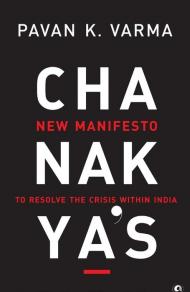#ChanakyasNewManifesto
Chanakya's New Manifesto to Resolve the Crisis within India
Chanakya (c. 270-380 BCE) was classical India's greatest thinker and teacher. Through his unparalleled ability to devise result-oriented military, political, and administrative strategy, he overthrew one king, crowned another and paved the way for
Read More..
Ratings
Likes
Reviews
None
9 years ago
A must read if you wish to understand the state of affairs as they were, and as they are. The ‘as will be’ is for us to create
We belong to a country that has enjoyed a well-fought independence and over six decades of democracy which we pride ourselves on. But there are gaping issues that have been threatening to pull the threads of stability to breaking point and it is high time we addressed them. While as Indians we realize there are problems and we each argue passionately about the possible solutions, Pavan K. Varma rounds them up and stamps a Chanakya mark of approval on them.Chanakya’s New Manifesto, details the pressing charges that hinder the progress of our country towards becoming a self-sustained global superpower. We got off to a promising start, as Mr. Varma highlights in the chapter 1947 and After, (“Nations seeking to fashion a future cannot do so without objectively interrogating the past”) but the machinery was never foolproof. With time and as Mr. Varma rightly points out, misguided governance, we as a country have fallen prey to the dissection of goals, and democracy is no longer the only pillar that can be expected to hold up our existence.I particularly appreciate the tone that this book takes, one of calm introspection that chooses to identify the key areas that need to be addressed at the earliest, without being patronizing, guilty, sentimental, or outright accusing; what Chanakaya prescribed as mandatory when drafting a governance plan. Mr. Varma’s analysis of issues, in the chapter Crisis, leave you with no doubt, what numbers we don’t see or hear about in the news. He insists and verifies with Chanakya’s written recommendations that democracy requires the backing of shrewd governance, something we observe lacking in the political setup today. You cannot but agree with him when he points out that multi-coalition structures are not stable and only serve to divert the efforts of politicians towards sustenance in politics and away from the interest of the public that votes them into the setup. The language that Mr. Varma employs to make his point is clear and reads like a well written report as opposed to a jargonized preamble for the future. This book deserves a thorough read and it is a trifle hard to discuss each point in detail because there’s so much to talk about. Some of the best opinions that I could relate to were with regard to democracy being a factor that helps focus away from religious extremism, the argument that it is ‘diversity’ and not ‘unity’ per se that keeps the nation together and the fact that a politician is not by default a good governor. Mr. Varma proposes corrective action, in terms of Chanakya’s prescriptions, to bring about a change in governance and take full advantage of the democracy that we claim is the greatest strength we possess as a republic. This book comes across both as a vision and a dream, fleeting yet achievable at the same time. If only.
 1 Like
1 Like
 DisLike
DisLike
Popularity
Ranks
This #hashtag is not ranked yet.

